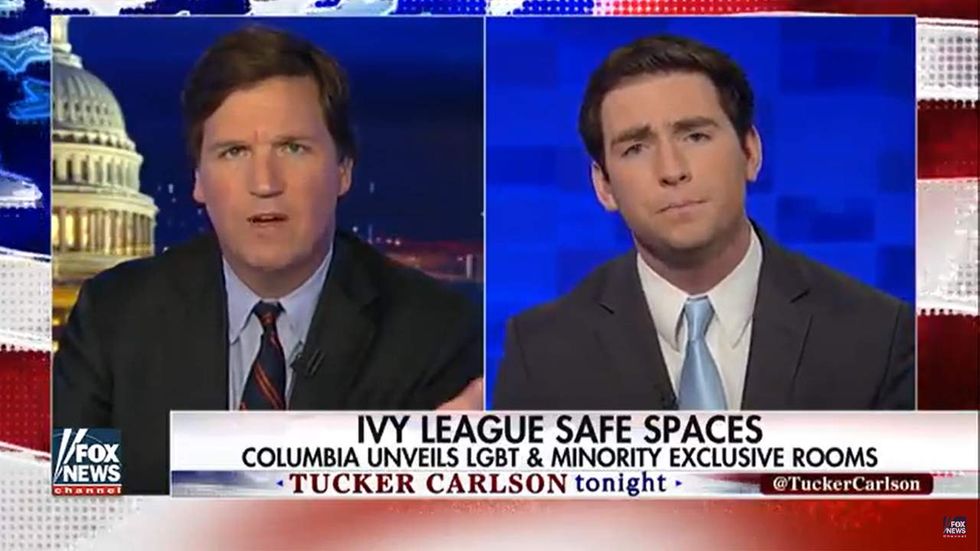
Sean Ryan, the co-chair for the Student Affairs Committee at Columbia University, joined Tucker Carlson on Fox News Channel's "Tucker Carlson Tonight" on April 7, 2017. (Image source: YouTube).

Columbia University recently decided to set aside two rooms for use by minority groups on campus. Students who do not fall into either group can only use these spaces when participating in events held by the groups who are permitted to use the rooms, leaving many advocates of true diversity and equality calling for Columbia to change its policy.
Sean Ryan, the co-chair for the Student Affairs Committee at Columbia University, joined Tucker Carlson on Fox News on Friday to defend the policy, and the debate that ensued should not be missed.
“This decision came at a time when we’ve been having a lot of issues around suicide and mental health and isolationism,” Ryan said. “So, we ended up deciding on dedicating one space to LGBT students and the other to the students of color, and this was a data-driven decision. Sixty-three percent of students who have died by suicide at Columbia since the year 2000 are students of color. Two LGBT students, openly LGBT students, have died by suicide at Columbia in the past three years. And, you know, what these spaces will do will provide support for those groups to fight the isolationism, you know, that’s been happening …”
[graphiq id="9z14fZxdDQF" title="Suicide Attempt Rate Among Transgender and Gender Non-Conforming Adults" width="600" height="600" url="https://w.graphiq.com/w/9z14fZxdDQF"]
“Ok, well I’m for empathy and I’m certainly against people harming themselves,” Carlson responded. “But the underlying assumption of what you just said is that being around people who are different is traumatic and that, of course, was the justification for segregation, so it’s a little surprising.”
Carlson later asked Ryan, who continued to suggest there was nothing racists or biased about the policy, whether a group of white students could use the rooms in question, to which Ryan responded, “They could use the room to come together for programming with students from those backgrounds, so that we could share experiences.”
“But what if they felt uncomfortable?” asked Carlson. “Because, obviously, Columbia has a relatively small percentage of white men there. They’re a distinct minority on campus, so if they wanted to set up their own area, would you be for that?”
“So, look, all communities have to prioritize their, you know, prioritize—all communities, businesses, organizations have to—”
“Sean, it’s a simple question,” Carlson interjected. “Would you be for that or not?”
“No, look, they have to prioritize their resources based on the needs of their community,” Ryan said. “What we’re seeing here is that these particular communities were in need, so therefore we reacted.”
“According to you, but what if a bunch of stray white kids got together and said, you know, we feel oppressed here, perhaps by people like you, Sean, and we need our own student-sponsored, school-paid-for room to gather with just straight white guys. Would you say, ‘I get that, that’s ok?’”
“Look, I think that given the data that we have around suicide and the pressing needs of our community and the limited space that we have, there are other ways in which that space can be used.”
“So, no, in other words. It’s a double standard. So, certain races get their own rooms and others don’t. That’s what you’re saying.”
“No, what I’m saying is that we’re reacting to needs, and we’re providing support for communities that have demonstrated those needs through data.”
“What you’re doing is using imprecise, silly academic talk to dodge my question.”
Ryan eventually conceded that the reason for the rooms is due to his belief that individuals might feel more comfortable and supported when around people just like them, which Carlson pointed out is a “radical” view, especially when only some groups receive advantages, since segregationists who wanted to keep African-Americans and white people apart made similar arguments.
According to a report by Campus Reform, one unidentified freshman at Columbia said, “There are many spaces on campus, especially those that are dominated by straight males, that leave me tense. An LGBTQ+ Center would offer me yet another space where I could feel like I am safe to simply exist and be me.”
The Blaze reported on Tuesday Columbia was the only Ivy League college to not have a space dedicated to LGBT students.
Justin Haskins